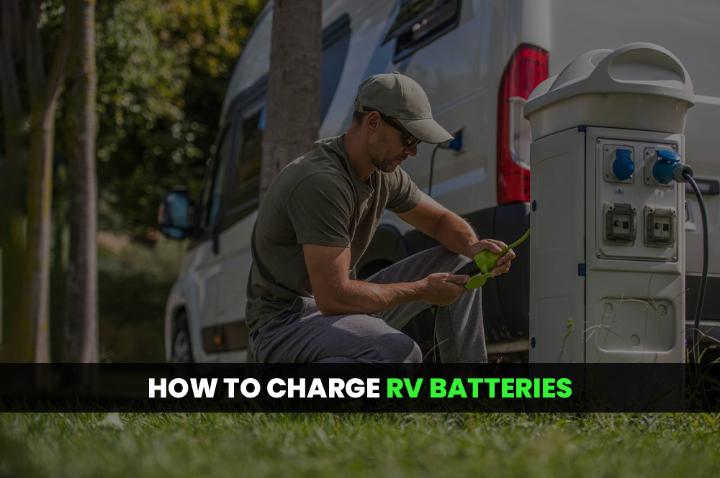How to Charge RV Batteries

If you’re an RV enthusiast, you know that keeping your RV batteries running is essential to a smooth and enjoyable trip. In this guide, we’ll explore quick ways to charge your RV battery and provide valuable insights to ensure it lasts longer. Whether you’re an experienced RVer or a new novice, understanding how to charge an RV battery is critical to a stress-free trip.
Fastest Way to Charge an RV Battery
Before we get into the specifics, let’s consider the quickest way to charge an RV. Time can be of the essence, especially when you’re anxious to hit the road again. The quickest way is to use a high voltage charger or converter that is typically made for RV batteries. These devices are capable of providing great power to your batteries, significantly reducing charging time.
How to Charge RV Batteries
Now, let's delve into the basics of charging RV batteries. Understanding these fundamental concepts will help you make informed decisions about the methods and equipment you choose for your battery charging needs.
Method 1: Shore Power Combined with a Converter
Shore power, also known as campground hookups, is a reliable way to charge your RV batteries. If you are parked in a campground with power lines. You can use an electrical cord to power your RV. You will need a converter to charge your battery properly. A converter converts AC (alternating current) power from the shore to DC (direct current) power that can be used by your RV battery. This method is convenient and provides consistent energy.
Method 2: Camping Generators
As individuals who enjoy recreational vehicle (RV) travel, a significant number of us prefer to escape the crowds by parking our RVs in Boondock on public lands or other suitable sites. Thus, Camping generators are a versatile way to charge an RV battery when you’re off the grid. These generators run on gasoline, propane, or diesel, and can power your RV. Choosing a generator with enough wattage to meet your RV’s power demand is important. You can also use a battery charger to speed up charging when using a generator.
Method 3: Solar Power
Solar panels are an excellent choice for environmentally conscious RVs. Solar panels on the roof of your RV harness the energy from the sun and convert it into electricity to charge your battery. This method is consistent and works well in sunny areas. It should be noted that the efficiency of solar can vary depending on the weather and how many solar panels you have.
Method 4: RV Vehicle Engine
You can also use your RV’s engine to charge its battery. When you drive, your car’s alternator produces electricity, which can be connected to your RV battery. However, this method is quite slow compared to other methods, and may not fully charge your battery on short trips.
Method 5: Tow Vehicle 12V Feed
When towing a trailer, you can use the 12V feed from your trailer to charge your RV battery. This method uses the proper wiring and connectors to connect your RV to your towed vehicle. While it’s not the fastest option. It is a useful way to ensure your battery stays charged while you’re on the road.
RV Battery Charging Safety Tips
Now that we've explored various methods of charging RV batteries, let's discuss essential safety tips to keep in mind:
Inspect Your Batteries: Regularly check the condition of your RV batteries for signs of damage, corrosion, or leakage.
Use Proper Cables and Connectors: Ensure that you use the correct cables and connectors for charging your batteries to prevent accidents or damage.
Ventilation: When charging batteries, especially with generators, make sure there is proper ventilation to dissipate any potentially harmful fumes.
Monitor Battery Temperature: Overheating can be a concern when charging batteries. Keep an eye on the temperature and stop charging if it becomes excessively hot.
Follow Manufacturer's Guidelines: Always adhere to the manufacturer's recommendations for charging and maintaining your specific RV batteries.
Emergency Disconnect: Install an emergency disconnect switch to quickly cut off power to your batteries in case of an emergency.
Invest in Surge Protection: Consider using surge protectors to safeguard your RV's electrical system from power surges.
Fire Safety: Have fire extinguishers readily available in case of electrical fires, and know how to use them.
Regular Maintenance: Schedule routine maintenance for your RV's electrical system and batteries to ensure they remain in good working condition.
Conclusion
Charging your RV battery is key to a smooth and enjoyable RVing experience. With the right knowledge and equipment, you can charge your batteries and get ready for your next adventure. Remember to put safety first, follow the manufacturer’s recommendations, and choose the charging option that best suits your needs. Happy RVing.
Get the best RV batteries in Calgary from Batteries Store Calgary.
Read Next Blog: